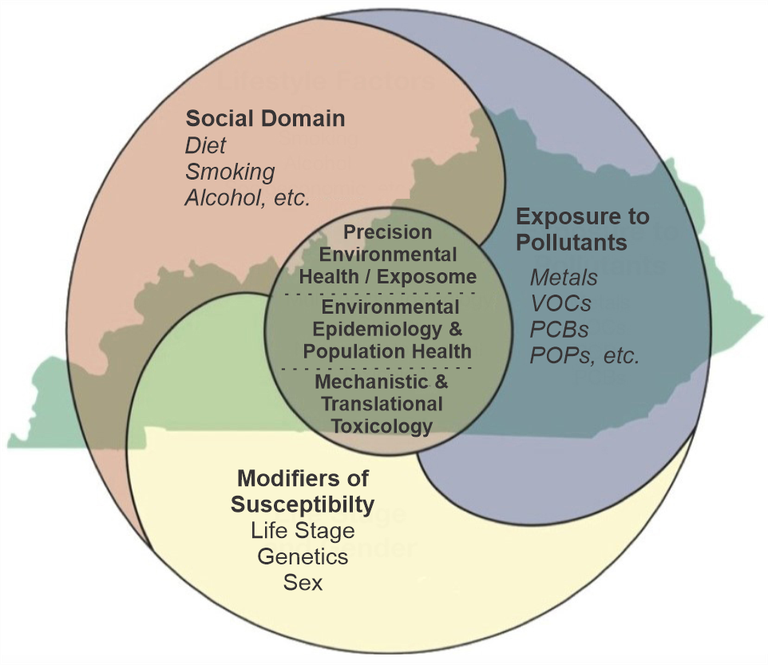Pilot Project Program
Specific Aims
A major goal for the CIEHS is to enhance the capacity for environmental health research at UofL. A part of this effort is the Pilot Project Program, which will foster novel research forming the basis for new extramural grant applications. Current strengths at UofL include how structural determinants of health/environmental toxicants influence multi-organ toxicology, cancer, and neurodevelopmental toxicology. Through availability of pilot project funds, we envision building capacity in these current areas of emphasis as well as expanding into new areas complementary to existing strengths. A mix of investigators will be targeted, including new early stage investigators, community partners, and established researchers who can apply their expertise in novel ways relevant to environmental health. The Program will publicize the availability of pilot project funds, solicit and coordinate the review of pilot project applications, make funding recommendations, monitor the progress of research projects, assess usage of center cores by pilot projects, and track deliverables. Results obtained through pilot projects will be disseminated via the annual Research!Louisville event. Because the ultimate goal is to develop new, self-sustaining research projects, an emphasis will be placed on facilitating and improving the quality of new grant applications pertaining to environmental exposures/structural determinants of health. Strategies for achieving this goal include obtaining feedback from CIEHS members regarding pilot project findings and experimental design as well as performing rigorous internal review of grant proposals. The Pilot Project Program is open to all eligible faculty regardless of race, color, national origin, sex, or age.

The overall goal of the Pilot Project Program is to increase environmental health research at UofL. To accomplish this goal, the following Specific Aims are proposed:
Specific Aim 1. To foster new research projects related to environmental exposures/structural determinants of health through provision of pilot project funds. Applications for pilot project funds will be solicited annually. Various types of investigators will be targeted for awarding of funds:
A) New investigators in early stages of their careers. The Program will co-ordinate with the Career Development Component of the Administration Core to provide research support for promising new investigators who will be receiving direct mentoring through the Center.
B) Community partners. Using a community-led citizen science approach, individuals from the community will be eligible to submit pilot project applications focusing on environmental health problems of local or regional significance. The CEC will provide mentoring to assist with identification of CIEHS collaborators, design of projects, and submission of pilot project applications.
C) Established investigators from other fields who can bring novel expertise or technology to bear on environmental health research. A collaboration with a CIEHS Member or Associate Member will be a condition for applying for this type of pilot project.
D) Established CIEHS investigators developing novel research directions, including community-engaged research. Applicants in this category will need to clearly demonstrate that the pilot project will move the investigator's work in a novel direction with high potential for funding by NIEHS.
Specific Aim 2. To disseminate research findings from funded pilot projects through the annual Research!Louisville event. Research!Louisville is an annual showcase that highlights current research at the University. The Pilot Project Program will organize an annual symposium at this event for presentations from pilot project recipients. These presentations will serve to communicate results to the UofL community and general public and will serve accountability and reporting functions for pilot project investigators.
Specific Aim 3. To promote and facilitate submission of new grant applications based on research originating from funded CIEHS pilot projects. Supported activities will include compilation and review of research results from pilot projects, discussion of grant application strategies, facilitation of additional collaborations, and internal review of draft proposals as means to promote high-quality grant submissions.
The Program will assist investigators throughout the pilot project life cycle from initial idea to extramurally funded project. Benchmarks of success for the Program include: 1) pilot projects awarded to community partners and investigators establishing new collaborations related to center themes; 2) presentations from pilot projects at Research!Louisville, and regional and national meetings; 3) peer-reviewed research publications supported by pilot project funding; 4) grant proposals submitted based on pilot project research; and 5) grant funding awarded related to center themes stemming from pilot project results. Completion of the Specific Aims is expected to generate significant new research funding and enhance the capacity for research in the environmental health sciences at UofL.
